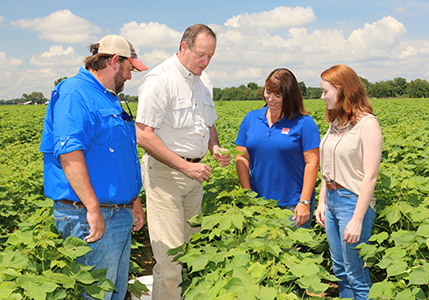Wheat & Feed Grain Farmers Help Upgrade Soil Lab

Alabama farmers will benefit from increased efficiency at Auburn University’s Soil, Forage and Water Testing Laboratory thanks to a $150,000 grant from the State Wheat & Feed Grain Producers checkoff fund. The contribution will replace major analytical systems.
Soil Test Lab Associate Director Reuben Beverly said these three mission-critical instruments — a robotic pH tester, inductively-coupled plasma (ICP) spectrometer and combustion analyzer — should be operational by this fall. The upgrades will continue the lab’s work and increase overall sample capacity, he added.
“We typically analyze about 24,000 samples a year,” Beverly said. “With the new instruments, we will hopefully increase that number to 30,000 this year and double it to 50,000 next year.”
The three instruments being replaced are 15 years old or older and have failed or could fail at any time. Beverly said they’re obsolete and exceed useful life expectancy so manufacturers no longer provide support, service and parts.
Beverly said technicians test soil pH by hand since the old pH tester failed, which takes most of the day. With the new robotic pH tester, six probes simultaneously read 60 samples in just 10 minutes.
The ICP spectrometer will read 100-120 samples an hour compared to the old machine’s 40 samples an hour. The new combustion analyzer will double the speed of nitrogen analysis.
The soil lab grant puts checkoff dollars to work for farmers like State Wheat & Feed Grain Committee Chair Scott Saucer. The checkoff is a self-imposed fee wheat and feed grain farmers pay for research, promotion and education.
“Healthy soil lays the foundation for successful crops,” said Saucer, who farms in Monroe County. “We need to know accurate pH, nitrogen and other levels so we can keep our soil in the best shape possible.”
The lab also tests fertilizer materials, plants, water, feed and forage, while providing farmers fertilizer and lime recommendations.
“Fertilizer recommendations are one of the services that benefit farmers most,” said Alabama Farmers Federation Wheat & Feed Grain Division Director Carla Hornady. “These recommendations allow farmers to optimize their yield by telling them the exact amount of fertilizer to apply. It saves the cost of applying unnecessary fertilizer.”
Beverly said the soil lab receives and tests 200 samples daily, and recommendations are returned to customers 24 hours later. Tests are $7. Visit aces.edu/anr/soillab to learn more.
Providing next-day service has been increasingly difficult with outdated machinery, a problem Beverly said he is excited to remedy.
“These upgrades will allow us to uphold our mission of providing timely and unbiased recommendation service to our customers,” Beverly said.
Click here for more information about the Alabama Wheat & Feed Grain Division.
